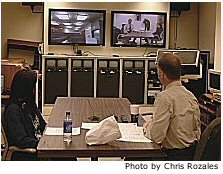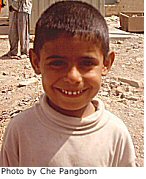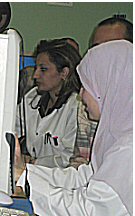|
edited by Krista Glen

The U.S. Department of State has recently announced that it will underwrite the restart of WiRED's telemedicine program in Iraq. This year, the program will include a general curriculum to update Iraqi physicians and nurses on current medical developments. In addition, the real-time video communications between physicians in American and Iraqi medical schools will focus on children's health and women's health, two critical healthcare issues now facing the people of Iraq.
WiRED will assemble a team of experts to supply lectures and interactive seminars that address these health problems.
Special Medical Focus:
Children's Health and Women's Health

Children's Health. WiRED's planners were driven by the findings of a May 2007 Save the Children report, which states: "Some 122,000 Iraqi children died in 2005 before reaching their fifth birthday. More than half of these deaths were among newborn babies in the first month of life . . . Iraq has made the least progress (of any country) in reducing child deaths since 1990." No other means exists to provide Iraqi physicians with the latest information that could help save many of these children, which is why WiRED will step in with a program that addresses some of the critical issues for infant and child health.

Women's Health. A recent study by the Iraqi government reveals a sharp increase in the incidence of breast cancer, especially in the southern regions of Iraq. According to the study, reported cases increased by 19 percent in just one year, between 2005 and 2006. Other cancers in women also recorded and increase. WiRED will concentrate a program on breast, ovarian and uterine cancers, special cardiac conditions and other health problems faced by Iraqi women. In addition to addressing these illnesses directly, WiRED plans to hold special video sessions between American and Iraqi female doctors.
This will offer a rare and valuable opportunity for female physicians in Iraq to share thoughts and concerns with their female colleagues in the U.S.
|
WiRED's very successful telemedicine program with Iraq was suspended last September after funds ran out. Medical partners at the University of California, San Francisco Medical School (adult medicine), Children's National Medical Center in Washington, D.C. (pediatrics) and San Francisco State University (nursing) provided regular lectures and occasional patient consultations with Iraqi doctors. WiRED installed the equipment at Iraq's four locations (Baghdad, Basrah, Erbil and Mosul), maintained the satellite connections and coordinated the delivery of medical information.
Following the suspension of its program in Iraq, WiRED received support from the Iraqi Ministry of Health, as well as a formal request to continue the program from Medical City Center, Iraq's largest teaching facility.
The restart of the U.S. government funding has enabled WiRED to plan its program for the next year, where the above medical partners will be joined by a host of other U.S. medical schools and medical subspecialty associations. This is the only medical education program currently operating across Iraq, and it is run almost entirely by volunteers. The annual operating budget is less than $500,000, and while the State Department is providing less than half that amount, WiRED is hopeful that it can arrange additional support after the program starts. A significant portion of budget goes directly to the purchase of satellite time.
In addition to the telemedicine program initiated last year, WiRED has been providing medical information in Iraq since 2003 when it installed the first Medical Information Center—an electronic medical library. During the past four years, WiRED has installed 39 such Centers in Iraqi medical schools and teaching hospitals across the country.
These Centers, as described in a letter sent from the U.S. State Department to Congressman Tom Lantos, Chairman of the Committee on Foreign Affairs, have "helped save lives and have supplemented the heroic work of highly stressed Iraqi doctors and nurses dealing with human suffering on a daily basis" and are "very much an example of American 'diplomacy of deeds' that reflects the best of our country to the world."
^ Back to the Top
|



